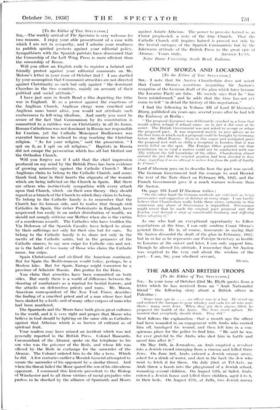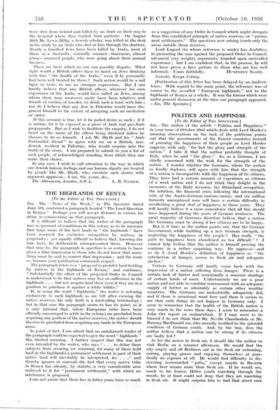THE ARABS AND BRITISH TROOPS
[To the Editor of nu: Sri•:cr.rrorc.J Sot,--In your issue of October 23rd Mr. Blyth quotes from a letter which he has received from an " Arab Nationalist friend " the following story about a British officer in Palestine :
" Some time ego in ... . an officer was in a bur. He stood up and ordered the barman to pour whiskey and soda for all who wen• there ; many were Jews. When they got their glasses filled, he proposed the health of the Arabs. The Jews stood aghast. He insisted that everybody should drink. They did."
Next follows the explanation—that a month ago the officer had been wounded in an engagement with Arabs who carried him off, bandaged his wound, and then left him in a con- spicuous place for the police to find him. " He said he was for ever grateful to the Arabs who shot him in }rattle and saved him after it."
On May lath, in Jerusalem, an Arab emptied a revolver into a Jewish crowd emerging from a cinema and killed three .Jews. On June 3rd, Arabs entered a Jewish orange grove, asked for a drink of water, and shot in the back the Jew who went to fetch it for theM. On July 23rd, at Tel-Aviv, an Arab threw a bomb into the playground of a .Jewish school, wounding several children. On August 13th, at Sided, Arabs entered a Jewish house and killed three children, aged 3 to 8, in their beds. On August 17th, at Jaffa, two Jewish nurses were shot from behind and killed by an Arab on their way to the hospital where they tended Arab patients. On August 20th Mr. Lewis Billig, a Jewish scholar, was killed at the desk in his study by an Arab who shot at him through the shutters. Nearly a hundred Jews have been killed by Arabs, most of them in a dastardly, cowardly manner—innocuous, almost always unarmed people, who were going about their normal business.
These arc facts which no one can possibly dispute. What right would a British officer have to insist on Jews drinking with him " the health of the Arabs," even if he personally had been well treated by them ? Such action would be a sad lapse in taste, to use no stronger expressions. But I can hardly believe that any British officer, whatever his own experience of the Arabs, would have called on Jews, among whom there may moreover easily have been relatives and friends of victims of murder, to drink such a toast with him ; nor do I believe that any Jew in Palestine would have dis- graced himself to the extent of accepting such an invitation or order.
If this account is true, let it be nailed down as such ; if it is untrue, let it be exposed as a piece of Arab and pro-Arab propaganda. But as I wish to facilitate the enquiry, I do not insist on the name of the officer being disclosed unless he chooses to do so himself. I ask Mr. Blyth and his " Arab Nationalist friend " to agree with me on a British, non- Jewish resident in Palestine, who would enquire into the truth of the story. I am prepared to submit to you a list of such people, of acknowledged standing, from which they can make their choice.
In any case, I wish to call attention to the way in which our Jewish human feelings and our human dignity are treated by people like Mr. Blyth, who circulate such stories with apparent approval.—I am, Sir, yours, &c., The Athenaeum, London, S. W.1. L. B. NAMIER.





















































 Previous page
Previous page